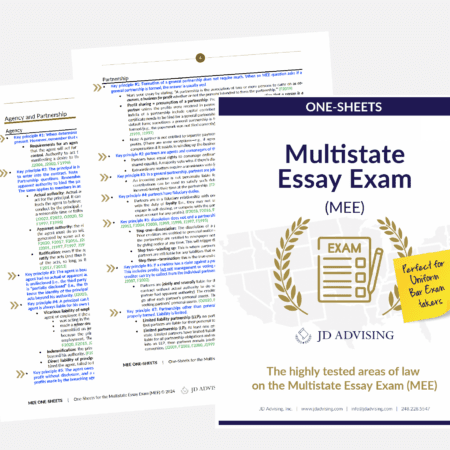Corporations and LLCs on the Multistate Essay Exam
Tips for Corporations and LLCs on the Multistate Essay Exam
This time in our MEE tips series we address Corporations and LLCs. When thinking about Corporations and LLCs on the Multistate Essay Exam, you should consider two questions: how is it tested? And how often is it tested? In the last 10 years (20 administrations), we’ve seen Corporations and LLCs on the Multistate Essay Exam 11 times. This makes Corporations and LLCs on the Multistate Essay Exam a frequently tested set of subjects. Additionally, the Examiners have the ability to test Corporations by itself, LLCs by itself, or some combination of the two! There are a lot of possible avenues for the Examiners to take!
Tips for Corporations and LLCs on the Multistate Essay Exam
Standard disclaimer: make sure you are preparing for all of the subjects! Use statistics regarding the frequency we see Corporations and LLCs on the Multistate Essay Exam appropriately. They should help you determine how much to study for the subject, not whether to study for it at all. Spend the most time on the subjects that are the most likely to come up. But do not ignore any subject!
Here are some of the most commonly tested topics in Corporations and LLCs on the Multistate Essay Exam:
The Basics of Incorporation
Don’t skip over the basics when studying for Corporations and LLCs on the Multistate Essay Exam.
- The Articles of Incorporation must be filed with the state and will control if there are conflicts with the bylaws. A corporation will not be liable for a contract entered into prior to incorporation unless it expressly or impliedly adopts the contract. By contrast, the promoter who entered into the contract on behalf of the soon-to be corporation will be liable.
- Shareholders are only owners and do not play a management role in the corporation. They have annual meetings, for which written notice is required 10-60 days before the meeting. Shareholders are permitted to vote by proxy or create voting agreements. In general, a majority of all outstanding shares entitled to vote (known as a quorum) must be present to hold a valid vote.
- Directors manage the corporation and act through votes. Shareholders have the power to hire and fire directors. Directors cannot vote by proxy or voting agreement, directors can “break quorum” by leaving during a vote, and notice will only be required for a special meeting.
The Basics of LLCs
In order to create an LLC, the Articles of Organization must be filed with the state. Members of an LLC have fiduciary duties (discussed in more detail below). They are also treated as agents of the LLC with actual and apparent authority to bind a member-managed LLC in ordinary affairs.
If a member leaves, then it leads to dissociation of that member, but it does not lead to winding up or dissolution of the LLC itself. (Note: This is unlike a partnership!)
Members are generally not liable for losses. However they will be liable if a court pierces the LLC veil or if proper dissolution procedures are not followed. “Piercing the LLC veil” frequently shows up on LLC problems. Many students forget this applies to LLCs!
Fiduciary Duties
The fiduciary duties owed by directors or LLC members are commonly tested in Corporations and LLCs on the Multistate Essay Exam. One major duty is the duty of care. There is a presumption that in making a business decision, the directors acted on an informed basis, in good faith and in the honest belief that the action taken was in the best interest of the company. Directors must be informed to an extent that they reasonably believe is appropriate. They are allowed to rely upon information, opinions, reports, or statements of corporate officers, legal counsel, public accountants, and others when they are making decisions. If a shareholder wants to challenge an action on the basis of a violation of the duty of care, that shareholder has the burden of proof to demonstrate that the duty of care has been breached.
The second major duty is the duty of loyalty. A director must act in good faith and with a reasonable belief that what he does is in the corporation’s best interest. The business judgment rule does not apply here. This issue typically comes up in three ways. First, when a director is on both sides of a transaction. Second, when a director may not compete with its corporation. Third, a corporation officer may not usurp a corporate opportunity. There are three defenses a director can assert if accused with a duty of loyalty breach. First, the transaction can be approved by disinterested directors if all relevant information is disclosed. Second, the transaction can be approved by disinterested shareholders. Lastly, the transaction can be judged to be fair at the time it was entered into.
Suits By and Against Shareholders
In some situations, courts will disregard the separate corporate entity and hold shareholders (or LLC members) personally liable for the corporation’s debts. This is called piercing the corporate veil. The plaintiff must show that the shareholder(s) or LLC member(s) abused the privilege of incorporating. Evidence of this includes undercapitalization of the business, failing to follow formalities, commingling of assets, confusion of business affairs, or deception of creditors.
Remember, as mentioned above, piercing the LLC veil comes up frequently in LLC problems!
Laura Sigler, who graduated magna cum laude from Wayne State University Law School, wrote this post.
Looking for highly-tested MEE topics in a convenient page?
 If you want to see the highly tested MEE topics in a convenient booklet, check out our MEE one-sheets which show you an overview of the highly-tested MEE subjects in one sheet (front and back) each!
If you want to see the highly tested MEE topics in a convenient booklet, check out our MEE one-sheets which show you an overview of the highly-tested MEE subjects in one sheet (front and back) each!
These are for sale in our online store and have received fantastic reviews!
One student recently told us “It was the best investment I’ve made in study materials and I’ve taken two noteworthy courses. Having the condensed material to refer to what was specifically tested saved me so much time in my studying process…”
This is just one of several reviews that you can read at the MEE one-sheets link!
You can purchase the MEE one-sheets below and read about them here.
Seeking MEE Expertise?
🌟 Freebies & Discounts
- Free Bar Exam Resource Center: Explore for leading guides, articles, and webinars.
- Expert-Crafted Bar Exam Guides: Unveil insights on high-frequency MEE topics and strategies for success.
- Free Webinars: Engage with top bar exam experts.
🔥 Top-Rated MEE Resources
- MEE One-Sheets: Boost your confidence with our most popular bar exam product!
- Bar Exam Outlines: Our comprehensive and condensed bar exam outlines present key information in an organized, easy-to-digest layout.
- NEW MEE Mastery Class: Unearth focused, engaging reviews of essential MEE topics.
- Bar Exam Crash Course and Mini Outlines: Opt for a swift, comprehensive refresher.
- MEE Private Tutoring and feedback: Elevate your approach with tailored success strategies.
- MEE Course: Preview our acclaimed five-star program for unmatched instruction, outlines, and questions.
🔥 NEW! Dive deep into our Repeat Taker Bar Exam Course and discover our unrivaled Platinum Guarantee Pass Program.






